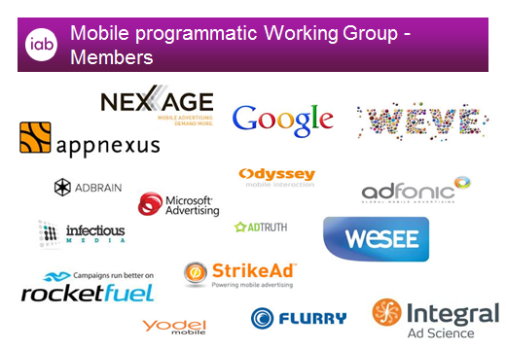Industry Group formed To Help Deliver The Elusive 'Year Of Mobile'
by on 27th Jan 2014 in News

Google, Microsoft and UK mobile operator joint venture Weve are among companies attempting to win over more brand spend in the notoriously tricky mobile display ad market with the formation of an industry working group that intends to spread further understanding of the two emerging sectors.
The three behemoths are backing the recently formed IAB mobile programmatic working group, a body which consists of sixteen firms (see image for an exhaustive list of members) which aims to spread further awareness of some of the complications of merging the programmatic and mobile practices.
Essentially this group aims to act as a bridge that can share skills and best practice between traditional mobile practitioners that want to know more about programmatic, and vice versa. This move echoes the IAB’s US arm - where the equivalent body is chaired by Victor Milligan, CMO of Nexage.
The UK mobile programmatic working group kicked off informally last year, and has now had its first formal meeting - followed by the trade body hosting a workshop to debate some of the issues of serving ads on mobile via programmatic channels. Among the presenters was ExchangeWire columnist Gareth Davies.
Alex Kozloff, IAB head of mobile, says: “A lot of people started asking about mobile and real-time bidding (RTB) on both the media agency side as well as the supply side, there is a general appetite to know more.”
She adds that the IAB mobile programmatic working group intends to follow up such activity by potentially formulating documents containing best practice guidelines, and identifying areas of concern where a collaborative approach can erode complications.
Zac Pinkham, interim Managing Director, EMEA, Millennial Media – one of the presenters at the seminar – says such collaboration is necessary as brands further develop their mobile marketing strategies.
He adds: “Mobile programmatic is a very hot topic right now. As more and more brands begin to explore programmatic options in mobile, there are a number of key considerations for advertisers.”
“With many similarities to programmatic buying in a full-serve environment, advance campaign life-cycle planning is essential to help advertisers map out goals in advance. First and third-party data is paramount, but while advertisers will have lots of valuable data to help forecast programmatic delivery they must also be aware that it’s not guaranteed.”
Fragmentation in a cookie-less world
Headaches for programmatic players looking to expand into the mobile sector include difficulties around targeting smartphone users via cookies (for instance Apple’s Safari browser blocks third-party cookies by default).
This, as well as fragmentation in the smartphone operating system market, adds further layers of complication for advertisers looking to expand their strategies to take in both smartphones and tablets.
Pinkham adds: “To help deliver campaigns, advertisers should consider a reliable and scalable technology partner who understands mobile and can help ensure they have a robust ability to ID users – it’s not a cookie-based ecosystem.
“Finally, advertisers should implement conversion tracking to ensure they are optimising their programmatic campaigns as they would direct buys.”
Meanwhile, Mike Nicholson, Opera Mediaworks, strategic partnerships director, EMEA, also spoke at the recent IAB seminar, and notes how the two industry sectors need a conduit to share their experiences as they begin to merge.
He adds: “One of the main things you have to think about on mobile is fragmentation [of the device types that the ads are served on].
“I don’t think a lot of the trading desks realise just how much work it requires to optimise ads that will work across the different device types [such as an Apple iPhone, and the multiple Android OS device types produced by multiple manufacturers.”
Gareth Davies, Adbrain CEO, told ExchangeWire, such collaboration was necessary as simply porting a strategy designed for desktop devices to mobile screens was simply flawed, plus the company was also poised to launch a private beta trial to improve mobile ad targeting and tracking.
He says: “Using the same ad server across all screens [desktop, tablet and smartphone] simply won’t work. A lot of education is needed and we hope to make it simpler [to target mobile users and track the ROI on campaigns]. The aim is to help mobile advertisers
Tom Pemberton, Yodel Mobile, director, serves on the mobile programmatic industry working group, underlines the urgency required to seize the opportunity presented by the rapid growth in mobile media consumption.
He says: “We only need to see the rapid growth in purchases made over tablets and mobiles over the Christmas period to recognise this rapidly changing trend.
“As consumers become more comfortable with the mobile technology the inventory and data available grows – providing a good opportunity for programmatic media buys.
“Being able to integrate this data with other mCRM opportunities such as Push, Text messaging and email should further deepen the relationship the client has with their consumers.”
Ad NetworkAdvertiserAgencyAnalyticsattributionCross-ChannelDigital MarketingDisplayDSPExchangeMartechMobileProgrammaticTargetingTrading Desk








Follow ExchangeWire